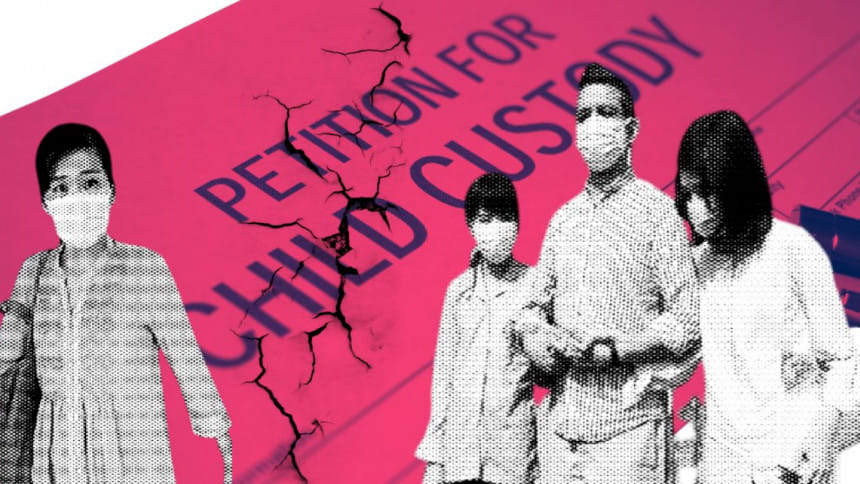Japanese mother vs Bangladeshi father: Key takeaways

In July 2021, Japanese mother Nakano Eriko came to Bangladesh to regain custody of her daughters, who had been taken away by their Bangladeshi father, Imran Sharif, from Japan. It is not an exaggeration to say that her ex-husband had abducted the two girls. The family court in Tokyo had ordered the children to be returned, but Sharif did not comply. As such, the Bangladeshi court handled the case. Japan is one of the few countries that does not provide joint custody of children in divorce cases. And in most cases, mothers receive custody of their children. Sharif could probably sense that he would not be granted custody and became desperate. This is somewhat understandable. But were his actions justifiable?
Joint custody not being an option often estranges non-custodial parents from their children. And while sole custody is ideal for mothers and children who have experienced domestic abuse, it is far from ideal for all cases. Pointing to the necessity to change Japan's sole custody system, in 2019, a report by the United Nations Committee on the Rights of the Child (CRC), stated that the law made it such that "a divorce of the married couple also represented an effective 'divorce' of one of the parents from the child." In 2022, a Justice Ministry panel in Japan proposed joint custody, which could be an option for divorcing parents. The sole custody system in Japan invites more inconvenience when a foreign spouse is involved. In such circumstances, the risk of international abduction of children by non-custodial parents increases. To address this, Japan joined the 1980 Hague Convention in 2014, which provided rules and procedures for the return of children under age 16 to their country of habitual residence if they have been taken or retained by one parent.
Since Eriko landed in Bangladesh to claim her daughters, during the peak of a pandemic, she had to fight an incredible battle for custody at the courts and the police station. Months passed by with no resolution. Eventually, she tried to leave Bangladesh with her two daughters, but was stopped at the airport under the order of the court. At one point, one of the daughters said she wanted to stay with her father in Bangladesh.
In the custody battle between the Japanese mother and Bangladeshi father, the relevance of the Hague Convention was invoked by Eriko's international family lawyer. Bangladesh is not a party to this Convention, but it still influences legal decisions made in Bangladesh. Eriko's lawyer attorney Jeremy D Morley wrote in his blog that "since the Hague Abduction Convention is the most important international treaty in all of the family law (possibly subject to the UN Convention on the Rights of the Child 1989), the provisions of the Convention have become part of customary international law and should therefore be applied by the courts in Bangladesh."
After observing the case for a while, I came to the conclusion that it would be better for Bangladesh's image abroad if the two children could be returned to Japan in accordance with the Hague Convention. Unfortunately, Bangladesh's good reputation was marred anyway due to the legal process and father's use of social media to stir up support for his case.
Since Eriko landed in Bangladesh to claim her daughters, during the peak of a pandemic, she had to fight an incredible battle for custody at the courts and the police station. Months passed by with no resolution. Eventually, she tried to leave Bangladesh with her two daughters, but was stopped at the airport under the order of the court. At one point, one of the daughters said she wanted to stay with her father in Bangladesh.
What happened next was another uncomfortable episode. Regular videos were posted from Sharif's Facebook profile to appeal to the masses' sentiments so that the two children could stay in Bangladesh. Sharif's mother joined in by claiming that she wanted to raise her granddaughter in a proper Islamic way, which would not be feasible if she went to Japan. They received hundreds of supportive comments. Sharif also decided to present his daughter in front of the public using social media. His videos showed her eating local fruits and making statements in support of her father. while wearing a big scarf.
On July 16, a Bangladeshi family court gave a judgement in favour of Nakano Eriko. The court took into account the fact that Eriko was the primary caregiver of the children, who were taken to another country without her knowledge and without following the legal procedures of Japan. The court viewed this as a "grave and deplorable act" against the universal concept of motherhood. Giving the father the right to visit the children, the court decided that as the girls have grown up in Japan, it would be best for their general well-being to live there with their mother. This is not surprising for those who are aware of the judicial trends in Bangladesh, which take into account the best interest of the child when it comes to custody issues. Though Bangladesh's guardianship laws are patriarchal (favouring the father to be the legal guardian), the judicial system has adopted a more child rights-based perspective.
As for the general public, who seemed quite invested in the case, they, too, should take comfort in knowing that the children will likely be better off with their mothers in the country they grew up in. And taking this case as a lesson, Bangladesh should become a party to the Hague Convention on the Civil Aspects of International Child Abduction so that no other foreign parent faces the inconvenience and lengthy procedure of the domestic judiciary in order to claim custody of their children.
Dr Sharin Shajahan Naomi is a postdoctoral fellow at Krea University in India.

 For all latest news, follow The Daily Star's Google News channel.
For all latest news, follow The Daily Star's Google News channel. 




Comments